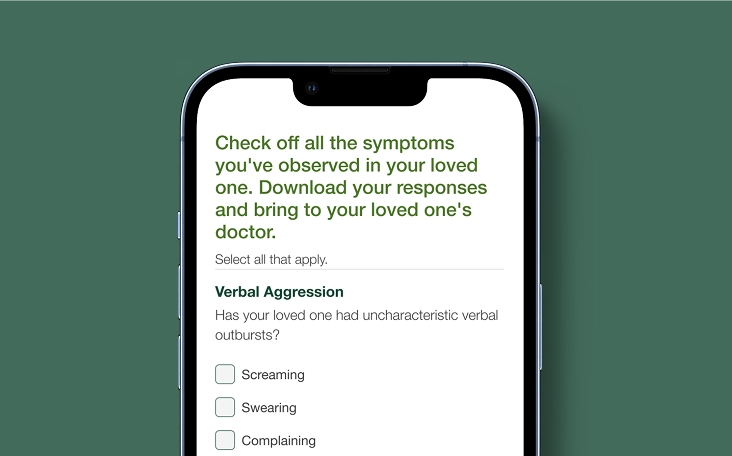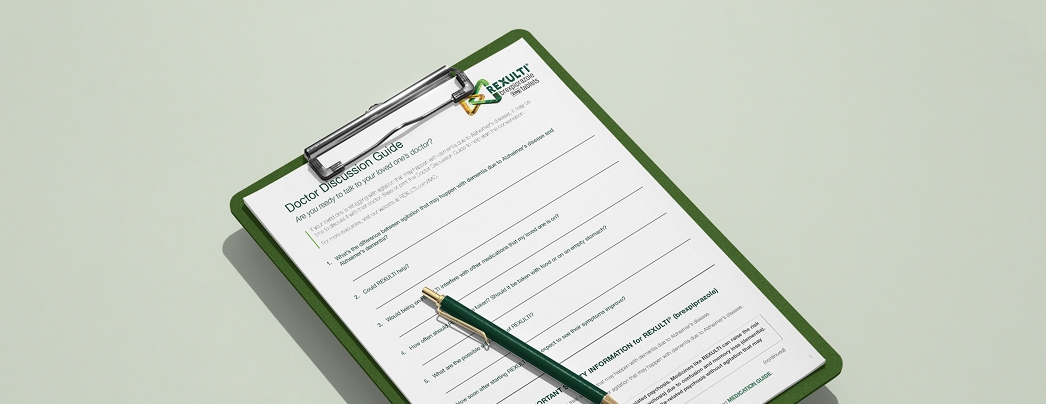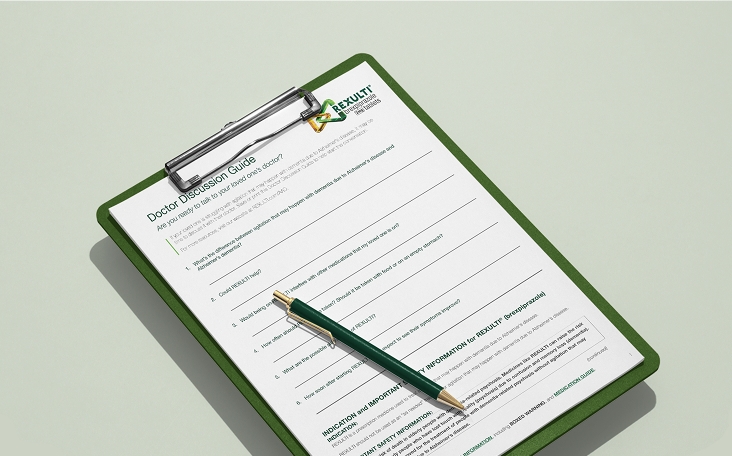IMPORTANT SAFETY INFORMATION:
- Increased risk of death in elderly people with dementia-related psychosis. Medicines like REXULTI can raise the risk of death in elderly people who have lost touch with reality (psychosis) due to confusion and memory loss (dementia). REXULTI is not approved for the treatment of people with dementia-related psychosis without agitation that may happen with dementia due to Alzheimer’s disease.
Do not take REXULTI if you are allergic to brexpiprazole or any of the ingredients in REXULTI.
REXULTI may cause serious side effects, including:
- Cerebrovascular problems, including stroke, in elderly people with dementia-related psychosis that can lead to death.
- Neuroleptic malignant syndrome (NMS) is a serious condition that can lead to death. Call your healthcare provider or go to the nearest hospital emergency room right away if you have some or all of the following signs and symptoms of NMS: high fever; changes in your pulse, blood pressure, heart rate, and breathing; stiff muscles; confusion; increased sweating.
- Uncontrolled body movements (tardive dyskinesia). REXULTI may cause movements that you cannot control in your face, tongue, or other body parts. Tardive dyskinesia may not go away, even if you stop taking REXULTI. Tardive dyskinesia may also start after you stop taking REXULTI.
- Problems with your metabolism such as:
- Unusual and uncontrollable (compulsive) urges. Some people taking REXULTI have had strong unusual urges, to gamble and gambling that cannot be controlled (compulsive gambling). Other compulsive urges include sexual urges, shopping, and eating or binge eating. If you or your family members notice that you are having new or unusual strong urges or behaviors, talk to your healthcare provider.
- Low white blood cell count. Your healthcare provider may do blood tests during the first few months of treatment with REXULTI.
- Decreased blood pressure (orthostatic hypotension) and fainting. You may feel dizzy, lightheaded or pass out (faint) when you rise too quickly from a sitting or lying position.
- Falls. REXULTI may make you sleepy or dizzy, may cause a decrease in your blood pressure when changing position (orthostatic hypotension), and can slow your thinking and motor skills which may lead to falls that can cause fractures or other injuries.
- Seizures (convulsions).
- Problems controlling your body temperature so that you feel too warm. Do not become too hot or dehydrated during treatment with REXULTI. Do not exercise too much. In hot weather, stay inside in a cool place if possible. Stay out of the sun. Do not wear too much clothing or heavy clothing. Drink plenty of water.
- Difficulty swallowing that can cause food or liquid to get into your lungs.
- Sleepiness, drowsiness, feeling tired, difficulty thinking and doing normal activities. Do not drive a car, operate machinery, or do other dangerous activities until you know how REXULTI affects you. REXULTI may make you feel drowsy.
Before taking REXULTI, tell your healthcare provider about all of your medical conditions, including if you:
- have or have had heart problems or a stroke
- have or have had low or high blood pressure
- have or have had diabetes or high blood sugar or a family history of diabetes or high blood sugar.
- have or have had high levels of total cholesterol, LDL cholesterol, or triglycerides, or low levels of HDL cholesterol
- have or have had seizures (convulsions)
- have or have had kidney or liver problems
- have or have had a low white blood cell count
- are pregnant or plan to become pregnant. REXULTI may harm your unborn baby. Taking REXULTI during your third trimester of pregnancy may cause your baby to have abnormal muscle movements or withdrawal symptoms after birth. Talk to your healthcare provider about the risk to your unborn baby if you take REXULTI during pregnancy.
- Tell your healthcare provider if you become pregnant or think you are pregnant during treatment with REXULTI.
- There is a pregnancy exposure registry for women who are exposed to REXULTI during pregnancy. If you become pregnant during treatment with REXULTI, talk to your healthcare provider about registering with the National Pregnancy Registry for Psychiatric Medications. You can register by calling 1-866-961-2388 or visit
http://womensmentalhealth.org/clinical-and-research-programs/pregnancyregistry/.
- are breastfeeding or plan to breastfeed. It is not known if REXULTI passes into your breast milk. Talk to your healthcare provider about the best way to feed your baby during treatment with REXULTI.
Tell your healthcare provider about all the medicines you take, including prescription and over-the-counter medicines, vitamins, and herbal supplements. REXULTI and other medicines may affect each other causing possible serious side effects. REXULTI may affect the way other medicines work, and other medicines may affect how REXULTI works. Your healthcare provider can tell you if it is safe to take REXULTI with your other medicines. Do not start or stop any medicines during treatment with REXULTI without first talking to your healthcare provider.
The most common side effects of REXULTI include weight gain, sleepiness, dizziness, common cold symptoms, and restlessness or feeling like you need to move (akathisia).
These are not all the possible side effects of REXULTI. For more information, ask your healthcare provider or pharmacist.
You are encouraged to report side effects of REXULTI (brexpiprazole). Please contact Otsuka America Pharmaceutical, Inc. at 1-800-438-9927 or FDA at 1-800-FDA-1088 (www.fda.gov/medwatch).
Please read FULL PRESCRIBING INFORMATION, including BOXED WARNING, and MEDICATION GUIDE.
INDICATION:
REXULTI is a prescription medicine used to treat agitation that may happen with dementia due to Alzheimer’s disease.
REXULTI should not be used as an “as needed” treatment for agitation that may happen with dementia due to Alzheimer’s disease.





